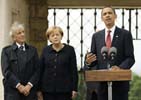
Following up on his speech in Cairo yesterday, President Obama, speaking at the Nazi Concentration Camp Buchenwald, today addressed the genocide in Darfur and his administration’s behind-the-scenes work to address Sudan’s immediate humanitarian needs and broader, long-term efforts to end the conflict.
In a response to a reporter’s question, here’s what the president said:
…On the issue of genocide, I think “never again” means that the international community has a obligation, even when it’s inconvenient, to act when genocide is occurring. So on the issue of Darfur, for example, I didn’t simply mention it in a speech yesterday before a Muslim audience, talking about genocide that’s taking place within a majority Muslim country, but I also raised it in discussions with President Mubarak of Egypt, who has strong diplomatic relations with the country of Sudan.
And I’ve assigned one of my closest national security advisors, General Scott Gration, as a special envoy who has been traveling throughout the region trying to not only solve the immediate humanitarian crisis that exists and that was made worse when President Bashir kicked out many of the international non-governmental organizations that have been providing humanitarian assistance. We’ve been working diligently to solve that immediate problem and get humanitarian assistance back on the ground. But what we’ve also been doing is to try to reactivate the possibilities of a peaceful — a peace settlement between Khartoum and some of the rebels in Darfur that would allow the internally displaced people from Darfur to start returning to their homes.
So we’ve been very active on this issue. It may not have received the attention in the press that some of the other issues have, but we are spending a lot of time trying to make sure that we make progress and that the people of Darfur are able to return to their homes and live in peace.
It is promising to see that President Obama knew it was insufficient to address ongoing genocide in just one line of his speech; it was imperative that President Obama discuss with Egyptian President Mubarak the role Egypt should play, as an important ally of Sudan, in resolving the conflict. Coming on the heels of a high-profile speech, with international headlines still buzzing about what the president did and didn’t say, the public is more tuned into his subsequent remarks, which is helpful for keeping a spotlight on Sudan. It’s also noteworthy that while the president avoided using the word ‘genocide’ yesterday to describe the conflict in Darfur, today he didn’t shy away. Against the backdrop of the site of unimaginable suffering, the president’s words are a powerful call to action.
But as we have been saying, along with editorial boards, activists, and U.S. leaders, President Obama’s strong rhetoric must be followed up with concrete action. This high-profile verbal commitment to ending the genocide in Darfur is very welcome, but we — and certainly the people of Darfur and Sudan as a whole — are waiting to see the tangible results.
N.B.: To listen to a powerful radio broadcast by Edward Murrow from 1945, reporting on the liberation of Buchenwald, click here.
Photo: President Barack Obama delivers remarks at Nazi concentration camp Buchenwald, alongside German Chancellor Angela Merkel and Holocaust survivor Elie Wiesel. AP/Ina Fassbender

